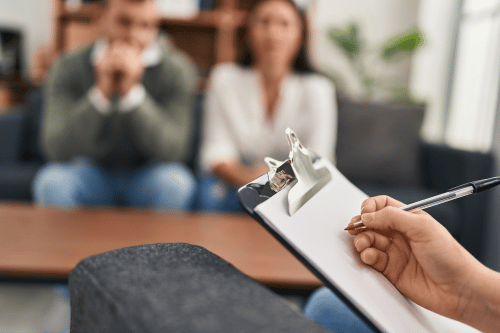

Addiction couples therapy is a growing solution for partners dealing with substance abuse, codependency, and mental health challenges. Relationships strained by drug use, compulsive behavior, or relapse often need more than individual treatment—they need structured counseling that addresses the couple’s shared experiences. At Sullivan Recovery in Mission Viejo, we offer outpatient support for those struggling with addiction while also providing resources that help strengthen the foundation of marriage, partnership, and emotional health.
Addiction couples therapy is a specialized form of counseling focused on helping couples navigate the impact of substance abuse. It works by improving communication, enhancing conflict management, and addressing shared patterns of addictive behavior. This therapy helps each partner understand the psychological and emotional damage caused by substance dependence while building new skills for sobriety and healthy interaction.
Couples therapy offers both partners a structured space to explore grief, resentment, and shame. These emotions are common in relationships affected by addiction and can fuel cycles of domestic violence or infidelity if left untreated.
Substance abuse can deeply damage the trust and structure of any interpersonal relationship. Whether it’s a marriage or long-term partnership, the emotional wounds run deep when substances begin to shape behavior and routine. In couples counseling, partners can rebuild a connection and develop healthier coping strategies through guided sessions.
Without support, these relationships often fall into codependency, enabling, or avoidant behavior. A trained addiction counselor helps each partner recognize patterns of enabling, withdrawal, or compulsive behavior, redirecting focus toward recovery and healthy boundaries.

Mental health disorders frequently accompany substance abuse issues, especially in couples who’ve experienced prolonged stress, trauma, or major depressive disorder. It’s not uncommon for one or both partners to battle anxiety, unresolved grief, or low self-worth, all of which can drive substance use and relationship dysfunction.
Addiction couples therapy integrates mental health support, using approaches like dialectical behavior therapy (DBT) to regulate emotion, improve self-awareness, and reduce impulsivity. These skills help couples handle intense conflict without escalating into psychological or physical violence.
Many couples affected by addiction fall into unhealthy emotional patterns. Codependency is one of the most common dynamics, where one partner feels responsible for the other’s addiction. This can lead to exhaustion, resentment, and neglect of personal needs.
Addiction couples therapy addresses these patterns using psychological frameworks such as attachment theory. Partners learn how early experiences, unresolved grief, or previous relationships have shaped their current behavior and emotional responses. With that understanding, they can develop healthier, more secure ways of relating to each other.
Substance abuse increases the risk of domestic violence, especially when drugs or alcohol heighten aggression or impair judgment. Couples therapy in the context of addiction must always prioritize safety and stability.
At Sullivan Recovery, we assess each couple to ensure that therapy is appropriate and that both partners feel secure. If there’s a history of violence, individual counseling may be required before or alongside any joint sessions. Our goal is to help couples work toward abstinence while also reducing risk and restoring emotional safety.
An addiction counselor or licensed therapist plays a central role in guiding recovery within a relationship. They act as a neutral facilitator, helping couples identify damaging cycles and create realistic goals. A good counselor teaches emotional regulation, stress management, and effective communication rooted in principles from psychology, behavior modification, and dialectical behavior therapy.
Many therapists also integrate Christian counseling or other spiritual perspectives when requested. These approaches can help couples reconnect with shared values, forgiveness, and long-term healing goals, especially when religion is a core part of their relationship. Therapists may also draw from social work and attachment theory to help partners address shame, grief, or unresolved anxiety that fuels substance dependence and compulsive behavior.
Therapists use education and clinical skill to explain how addictive behavior alters the brain and impacts interpersonal relationships. By focusing attention on learning new coping tools and understanding emotional triggers, therapists create a safe space for couples to reduce conflict, rebuild trust, and work toward lasting abstinence from substances.

Addiction often threatens the stability of a marriage. It introduces secrecy, financial strain, and emotional withdrawal. Marriage counseling can help couples address these challenges while working through issues like infidelity, parenting stress, and rebuilding trust through consistent counseling and shared focus on healing.
Addiction couples therapy blends principles from marriage counseling and substance abuse treatment, creating a focused approach. Couples learn to manage expectations, set boundaries, and support each other in maintaining sobriety without falling into old patterns. The therapist’s role includes helping couples understand how stress, resentment, anxiety, and major depressive disorder can influence behavior and decision-making within a marriage.
In some cases, domestic violence or verbal conflict may emerge as a result of long-term exposure to substances. Therapy gives couples the structure to break free from that cycle and rebuild their commitment. Through education, behavioral management strategies, and the guidance of a counselor, couples can reframe their relationship as a source of strength during recovery.
When addiction enters a household with children, the impact spreads beyond the couple. Parenting roles often shift dramatically. One parent may become emotionally unavailable, while the other carries the full weight of family management. These changes can lead to conflict and resentment.
Through couples therapy, parents can develop a unified approach to sobriety and parenting. Education around family systems and behavior modeling helps couples understand how their choices affect the next generation. This improves communication, cooperation, and long-term family health.
Recovery doesn’t end with detox. Couples therapy is a key strategy in preventing relapse by reducing stress, increasing accountability, and reinforcing abstinence. A supportive partner can make a major difference in long-term outcomes.
Therapists help couples set shared goals and routines that support recovery. These may include regular check-ins, stress-reduction techniques, and continued education around substance use and psychology. This shared focus builds unity and motivation.

Addiction changes the brain’s chemistry, affecting memory, decision-making, and emotion regulation. Couples therapy educates both partners on these changes, helping to remove shame and replace it with understanding.
This education promotes empathy and reduces blame. Instead of seeing the addicted partner as weak or selfish, the couple begins to see addiction as a disease that requires medical, psychological, and relational treatment.
Studies in psychology and social work show that couples therapy can improve abstinence rates and relationship satisfaction when used in substance abuse treatment. Research shows that couples who recover together are more likely to stay sober than those who recover apart.
At Sullivan Recovery, we use evidence-based approaches rooted in current addiction and mental health research. Our outpatient program allows couples to attend therapy while maintaining work, parenting, or daily responsibilities, creating a balance that supports real-life recovery.
Throughout treatment, couples gain practical tools they can use daily. These include:
These tools replace chaos with structure, allowing couples to rebuild their bond on a healthier foundation.
Addiction couples therapy can take many forms. Some couples prefer in-person sessions with a licensed therapist, while others benefit from online options or group counseling with other couples.
Sullivan Recovery offers flexible outpatient options that include both individual and joint sessions. Whether your relationship is recovering from infidelity, divorce threats, or daily emotional strain, therapy provides structure and a path forward.

Many couples draw strength from their faith during addiction recovery. Christian counseling incorporates scripture, prayer, and faith-based values into the therapy process. This approach can help couples find forgiveness, humility, and renewed purpose together.
Christian counseling can also help reduce shame and guilt by reframing addiction as a spiritual and emotional illness. When paired with traditional therapy and substance abuse education, this holistic model supports full-person healing.
Addiction is not a moral failure—it’s a disease of the brain and body that alters behavior and thinking. Couples therapy reframes addiction as a health issue rather than a personal flaw.
This shift reduces stigma and helps both partners commit to the process of recovery. With education, counseling, and ongoing focus, couples can break cycles of substance dependence and move toward lifelong sobriety.
Addiction couples therapy is a vital tool for healing relationships affected by drugs, alcohol, and emotional dysfunction. It offers a safe place to address behavior, express emotion, and rebuild trust. At Sullivan Recovery, we support couples ready to commit to abstinence, emotional health, and lasting sobriety.
If you or your partner are struggling with substance abuse, don’t wait. Contact Sullivan Recovery in Mission Viejo today to begin the process of healing your relationship and your life.
At Sullivan Recovery, as an in-network provider we work with most insurance plans, such as:
And More
If you or a loved one are struggling with mental health challenges or substance abuse, reach out to Sullivan Recovery today. Our team of compassionate professionals is here to support your journey towards lasting well-being. Give us a call at 949-836-7180.
Yes, addiction couples therapy can still be effective if only one partner is struggling with substance abuse. Therapy helps both individuals understand the dynamics that contribute to addictive behavior and teaches healthy communication and support strategies. It can reduce enabling patterns and promote long-term sobriety for the partner in recovery.
Absolutely. Addiction couples therapy supports all committed relationships, including unmarried and same-sex couples. The focus is on shared emotional health, communication, and addressing substance use issues, regardless of legal marital status or gender identity.
The length of therapy depends on the couple’s goals, the severity of substance dependence, and the presence of issues like codependency or mental health disorders. Some couples benefit from 8–12 weeks of focused counseling, while others continue therapy for several months to maintain stability and prevent relapse.
Yes, combining couples therapy with individual counseling or group recovery programs often leads to better outcomes. Partners can address personal mental health challenges like anxiety, shame, or grief while also building relationship skills through couples sessions. Many recovery plans also include education, 12-step groups, or community-based support like Al-Anon.